RISC-V Powered Mango Pi Takes on Raspberry Pi Zero at Its Own Game
A new, small, single board computer from Mango Pi uses the Allwinner D1 RISC-V chip.
Over the past decade there have been many Raspberry Pi clones. The latest clones the Raspberry Pi Zero form factor but introduces a RISC-V processor in place of the usual Arm powered SoC. MangoPi has appeared in a series of Twitter posts (as reported by Liliputing), and looks like a good choice for those needing more fruit in their diet.
The Mango Pi MQ Pro, in fact. The little Allwinner D1 processor we’ve covered before beats at its heart, a 1 GHz single-core, 64 bit chip built on the open-source RISC-V architecture. RAM can range from 512MB to 2GB, and while the MQ Pro carries enough ports (2x USB Type-C, HDMI, Wi-Fi and Bluetooth), along with its 40-pin GPIO (Pi compatibility to be confirmed), to function solo, there's also a carrier board in testing to add Ethernet and USB Type-A.
The MQ Pro isn’t the first Mango Pi board. The company, whose Twitter account gives its location as Beijing and New York, previously created the postage-stamp sized Mango Pi MQ around an Allwinner D1s processor. This tiny SBC sports a pair of USB Type-C ports, but no video output beyond a 15-pin DSI FPC connector.
There's scant additional information about the MQ Pro. The official web page is mostly blank, the GitHub repository is empty. The MQ board runs Tina Linux, Xboot, and RTT-smart, so we should expect to see those on the new board, and the recent appearance of RISC-V in the mainline Linux kernel could see more familiar distributions make their way to the boards. The Twitter account claimed last month to be porting Debian.
The board isn't available for purchase yet, and the company is sharing few details. We were also unable to find the MQ board for sale anywhere.
Get Tom's Hardware's best news and in-depth reviews, straight to your inbox.

Ian Evenden is a UK-based news writer for Tom’s Hardware US. He’ll write about anything, but stories about Raspberry Pi and DIY robots seem to find their way to him.
